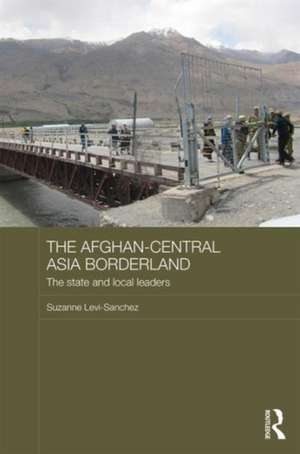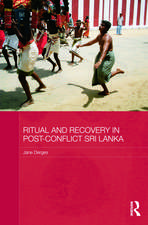The Afghan-Central Asia Borderland: The State and Local Leaders: Central Asian Studies
Autor Suzanne Levi-Sanchezen Limba Engleză Hardback – 21 iul 2016
Din seria Central Asian Studies
-
 Preț: 379.30 lei
Preț: 379.30 lei -
 Preț: 354.69 lei
Preț: 354.69 lei -
 Preț: 324.35 lei
Preț: 324.35 lei -
 Preț: 348.60 lei
Preț: 348.60 lei -
 Preț: 394.09 lei
Preț: 394.09 lei - 12%
 Preț: 299.52 lei
Preț: 299.52 lei - 18%
 Preț: 1164.44 lei
Preț: 1164.44 lei -
 Preț: 407.52 lei
Preț: 407.52 lei - 26%
 Preț: 764.20 lei
Preț: 764.20 lei - 18%
 Preț: 1057.75 lei
Preț: 1057.75 lei - 28%
 Preț: 821.06 lei
Preț: 821.06 lei - 18%
 Preț: 1111.40 lei
Preț: 1111.40 lei - 13%
 Preț: 297.57 lei
Preț: 297.57 lei - 18%
 Preț: 1055.51 lei
Preț: 1055.51 lei - 14%
 Preț: 312.77 lei
Preț: 312.77 lei - 16%
 Preț: 299.52 lei
Preț: 299.52 lei - 19%
 Preț: 702.06 lei
Preț: 702.06 lei - 18%
 Preț: 1056.35 lei
Preț: 1056.35 lei - 18%
 Preț: 727.19 lei
Preț: 727.19 lei - 16%
 Preț: 260.93 lei
Preț: 260.93 lei - 18%
 Preț: 1218.34 lei
Preț: 1218.34 lei -
 Preț: 407.78 lei
Preț: 407.78 lei -
 Preț: 482.74 lei
Preț: 482.74 lei -
 Preț: 419.70 lei
Preț: 419.70 lei -
 Preț: 416.22 lei
Preț: 416.22 lei - 18%
 Preț: 1053.16 lei
Preț: 1053.16 lei - 15%
 Preț: 309.69 lei
Preț: 309.69 lei - 18%
 Preț: 1014.65 lei
Preț: 1014.65 lei -
 Preț: 436.14 lei
Preț: 436.14 lei - 18%
 Preț: 1057.05 lei
Preț: 1057.05 lei - 18%
 Preț: 1060.87 lei
Preț: 1060.87 lei - 26%
 Preț: 763.23 lei
Preț: 763.23 lei -
 Preț: 488.71 lei
Preț: 488.71 lei - 18%
 Preț: 1108.42 lei
Preț: 1108.42 lei - 18%
 Preț: 1057.05 lei
Preț: 1057.05 lei - 31%
 Preț: 767.47 lei
Preț: 767.47 lei
Preț: 846.92 lei
Preț vechi: 1177.68 lei
-28% Nou
Puncte Express: 1270
Preț estimativ în valută:
162.06€ • 173.30$ • 135.12£
162.06€ • 173.30$ • 135.12£
Carte tipărită la comandă
Livrare economică 17 aprilie-01 mai
Preluare comenzi: 021 569.72.76
Specificații
ISBN-13: 9781138912892
ISBN-10: 1138912891
Pagini: 196
Ilustrații: 6
Dimensiuni: 156 x 234 x 18 mm
Greutate: 0.41 kg
Ediția:1
Editura: Taylor & Francis
Colecția Routledge
Seria Central Asian Studies
Locul publicării:Oxford, United Kingdom
ISBN-10: 1138912891
Pagini: 196
Ilustrații: 6
Dimensiuni: 156 x 234 x 18 mm
Greutate: 0.41 kg
Ediția:1
Editura: Taylor & Francis
Colecția Routledge
Seria Central Asian Studies
Locul publicării:Oxford, United Kingdom
Public țintă
Postgraduate and UndergraduateCuprins
1. Introduction
2. Conceptualization, Theoretical Framework, and Methodology
3. Border Development in Badakhshan
4. Ancient Myths, Modern Identity
5. The Social Organization of the Borderlands of Gorno-Badakhshan
6. Border Institutions: Ruling the Unruly or Unruling the Rulers?
7. The Social Organization of Opium in Afghan Badakhshan
8. Conclusion
2. Conceptualization, Theoretical Framework, and Methodology
3. Border Development in Badakhshan
4. Ancient Myths, Modern Identity
5. The Social Organization of the Borderlands of Gorno-Badakhshan
6. Border Institutions: Ruling the Unruly or Unruling the Rulers?
7. The Social Organization of Opium in Afghan Badakhshan
8. Conclusion
Notă biografică
Suzanne Levi-Sanchez is a Postdoctoral Researcher at Rutgers University, USA.
Descriere
Based on extensive fieldwork in the Afghan and Tajik Badakhshan borderlands, this book shows how implantation of formal institutional border structures can be counterproductive. This is because it can marginalise local leaders and alienate the local population, thereby increasing overall instability. The book shows how, in this particular borderland, trafficking, corrupt border personnel, and imperfect new institutional arrangements, contributed to a complex mix of oppression and resistance, benefitting illicit traders and hindering humanitarian work.

















